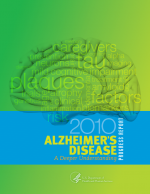Written by Bret S. Stetka, MD, Editorial Director, Medscape From WebMD
Which Foods Are Best for the Brain?
 Diet is inextricably linked to conditions such as heart disease, obesity, and diabetes. However, what we consume also seems to have significant implications for the brain: Unhealthy diets may increase risk for psychiatric and neurologic conditions, such as depression and dementia, whereas healthy diets may be protective. Based primarily on recent Medscape News coverage, the following collects some of the more prominent investigations on nutrition and the brain into a single resource to aid in counseling your patients.
Diet is inextricably linked to conditions such as heart disease, obesity, and diabetes. However, what we consume also seems to have significant implications for the brain: Unhealthy diets may increase risk for psychiatric and neurologic conditions, such as depression and dementia, whereas healthy diets may be protective. Based primarily on recent Medscape News coverage, the following collects some of the more prominent investigations on nutrition and the brain into a single resource to aid in counseling your patients.
Make for Malta in Depression, Stroke, and Dementia
A 2009 study published in Archives of General Psychiatry found that people who follow Mediterranean dietary patterns — that is, a diet high in fruits, vegetables, nuts, whole grains, fish, and unsaturated fat (common in olive and other plant oils) — are up to 30% less likely to develop depression than those who typically consume meatier, dairy-heavy fare. The olive oil-inclined also show a lower risk for ischemic stroke and are less likely to develop mild cognitive impairment and Alzheimer disease, particularly when they engage in higher levels of physical activity.
Fat: The Good and the Bad
A study conducted in Spain reported that consumption of both polyunsaturated fatty acids (found in nuts, seeds, fish, and leafy green vegetables) and monounsaturated fatty acids (found in olive oil, avocados, and nuts) decreases the risk for depression over time. However, there were clear dose-response relationships between dietary intake of trans fats and depression risk, whereas other data support an association between trans fats and ischemic stroke risk. Trans fats are found extensively in processed foods, including many commercial chocolates. A deficiency in polyunsaturated fatty acids has been linked to attention deficit/hyperactivity disorder in children.
Fish Oil to Fend Off Psychosis?
Thanks to their high levels of polyunsaturated fatty acids, namely omega-3 fatty acids, fish can help fend off numerous diseases of the brain. A 2010 study correlated fish consumption with a lower risk for psychotic symptoms, and concurrent work suggested that fish oil may help prevent psychosis in high-risk individuals. Although data are conflicting, new research shows that the omega-3 fatty acids eicosapentaenoic acid and docosahexaenoic acid are beneficial in depression and postpartum depression, respectively, and other research suggests that omega-3 deficiency may be a risk factor for suicide. Oily, cold-water fish, such as salmon, herring, and mackerel, have the highest omega-3 levels.
Berries for Oxidative Stress
Polyphenols, namely anthocyanins, found in berries and other darkly pigmented fruits and vegetables may slow cognitive decline through antioxidant and anti-inflammatory properties. A study in rats from 2010 showed that a diet high in strawberry, blueberry, or blackberry extract leads to a “reversal of age-related deficits in nerve function and behavior involving learning and memory.” In vitro work by the same group found that strawberry, blueberry, and acai berry extracts — albeit in very high concentrations — can induce autophagy, a means by which cells clear debris, such as proteins linked to mental decline and memory loss. Berry anthocyanins may also reduce cardiovascular disease risk by reducing oxidative stress and attenuating inflammatory gene expression.
A “Whole” Diet: Make Room for Red Meat?
A so-called “whole” diet high in fruits, vegetables, whole grains, and high-quality meats and fish results in a 30% risk reduction for depression and anxiety disorders, compared with consumption of a “Western diet” high in processed foods and saturated fats, according to a 2010 study. Even unprocessed red meat seems to be protective against depressive and anxiety disorders, in contrast to many studies in which red meat often falls into the category of “unhealthy” food. In speaking with Medscape News, principal investigator Dr. Felice Jacka specifically addressed the importance of farming practices: Despite the growing locavore movement, much of the livestock in the United States is still raised on industrial feedlots, which “…increases saturated fat and decreases very important good fatty acids…pasture-raised animals have a much healthier fatty acid profile.” A “whole” dietary pattern may also reduce depression risk, as assessed at 5-year follow-up.
Alcohol: Always in Moderation
The Greeks touted “nothing in excess,” a refrain that still rings true: Low to moderate* alcohol consumption has been associated with numerous potential physiologic benefits, including improved cholesterol profiles, beneficial effects on platelet and clotting function, and improved insulin sensitivity. According to a recent meta-analysis, limited alcohol use is associated with a lower risk for overall and Alzheimer dementia, a finding supported by a 2011 study of German primary care patients. Moderate alcohol intake may also protect against cerebrovascular disease, with wine potentially having added benefit because of its polyphenolic antioxidant components (ie, resveratrol). However, the health costs of alcohol consumption beyond low to moderate intake can quickly outweigh benefits to the brain, as heavy and long-term alcohol use can lead to alcohol abuse and dependence, impair memory function, contribute to neurodegenerative disease, and hinder psychosocial functioning.
*The US Food and Drug Administration defines “moderate alcohol consumption” as up to 1 drink per day for women and up to 2 drinks per day for men. One drink is equivalent to 12 fluid ounces of regular beer, 5 fluid ounces of 12% alcohol wine, or 1.5 fluid ounces of distilled spirits.
Brewed Awakening: Coffee for Depression and Stroke
The world’s most widely used stimulant might do more than just wake us up: A 2011 meta-analysis found that consumption of 1-6 cups of coffee a day cut stroke risk by 17%. Although it may increase blood pressure, coffee beans contain antioxidant compounds that may reduce oxidation of low-density lipoprotein cholesterol, and coffee consumption has also been associated with increased insulin sensitivity and reduced concentrations of inflammatory markers. Another 2011 study reported that women who drink 2-3 cups of coffee per day have a 15% decreased risk for depression, compared with those who drink less than 1 cup per week. A 20% decreased risk was seen in those who drank 4 cups or more. The short-term effect of coffee on mood may be due to altered serotonin and dopamine activity, whereas the mechanisms behind its potential long-term effects on mood may relate to its antioxidant and anti-inflammatory properties, both factors that are thought to play a role in depressive illnesses.
Chocolate — and Still More Antioxidants
Chocolate — the darker the better — seems to help scavenge free radicals and improve endothelial and platelet function, likely via flavanols (such as catechin), a group of plant-derived polyphenols. A 2010 cohort study published in European Heart Journal found that consumption of 6 g of chocolate daily — a standard Hershey bar weighs 43 g — was associated with a 39% lower combined risk for myocardial infarction and stroke in adults,[34] whereas data collected from the Swedish Mammography Cohort demonstrated a 20% decreased risk for stroke in women who regularly consume chocolate. Although chocolate has been associated with a positive influence on mood, possibly mediated by the dopamine and opioid systems, an extensive review by Parker and colleagues suggests that the benefits are not sustained, with emotional “comfort” eating actually contributing to depressed mood.
What Not to Eat?
Saturated fats and refined carbohydrates have highly detrimental effects on the immune system, oxidative stress, and neurotrophins, all factors that are known to play a role in depression. The study by Akbaraly and colleagues cited previously showed that a diet rich in high-fat dairy foods and fried, refined, and sugary foods significantly increases risk for depression. Similar findings were seen in another study from Spain, showing that intake of such foods as pizza and hamburgers increased the risk for depression over time, and in another study, women with a diet higher in processed foods were more likely to have clinical major depression or dysthymia. Research published last year also showed for the first time that quality of adolescents’ diets was linked to mental health: Healthier diets were associated with reduced mental health symptoms and unhealthy diets with increased mental health symptoms over time. Excess salt intake has been long known to increase blood pressure and stroke risk; however, recent data also correlate high salt intake, as well as diets high in trans or saturated fats, with impaired cognition.
Source: http://www.medscape.com/features/slideshow/brain-food?src=mp&spon=17
Like this:
Like Loading...
 When scientists look back to the first quarter of the 21st century, they may marvel at what was accomplished in the treatment and prevention of Alzheimer’s Disease. Alzheimer’s is the most common form of dementia and is reaching global proportions. The World Health Organization says more than 35 million people now live with dementia and that number is projected to double by the year 2030.
When scientists look back to the first quarter of the 21st century, they may marvel at what was accomplished in the treatment and prevention of Alzheimer’s Disease. Alzheimer’s is the most common form of dementia and is reaching global proportions. The World Health Organization says more than 35 million people now live with dementia and that number is projected to double by the year 2030.






